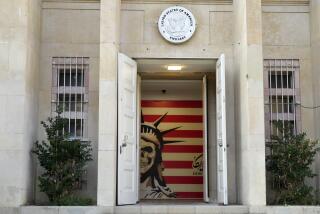When a regime came tumbling down
Five years ago Wednesday, U.S. forces entered the heart of the Iraqi capital, and Saddam Hussein’s regime fell. While much of the world watched the downfall of Hussein and the destruction of his huge statue in central Baghdad’s Firdos Square on television, Iraqis lived it. They have memories of what they were feeling as Hussein was toppled from power. Here are some of them:
--
Two weeks before the start of the war, I was called up for military service. I went AWOL. This was a very dangerous decision. If I had been caught, a firing squad would have executed me in public.
I stayed with my mother, sister and brother in our house near Hussein’s presidential complex, the area now known as the Green Zone. When fighting erupted nearby, our mother decided we should go to a safer place in northern Baghdad’s Adhamiya neighborhood. Relatives there welcomed us.
They talked about how Iraqi forces and Hussein were defending Baghdad. But I knew it was a lie. Iraqi soldiers had been selling their boots so they could buy bus tickets home.
We kept track of the war by watching Al Alam, the Arabic-language Iranian station that was the only non-Iraqi television available without an illegal satellite dish.
On April 9, my mother asked me to come watch TV with our relatives. My cousin’s mother was crying at the sight of U.S. tanks in Firdos Square, where the statue had been, and of Iraqis dancing with American troops.
“Those are traitors. They are kissing the enemy,” she sobbed.
I was so happy I could barely hide my feelings. My mother shushed me.
Finally, I couldn’t stand it anymore.
I started clapping and shouted, “Yeah Saddam, go to hell!!!”
Our relatives glared at me. Their oldest son said, “These are occupiers and everybody should prepare their guns for the battle’s next stage.” A few weeks later, he was the first in our family to get a job with an American company.
Our host’s father, in his 80s, watched the U.S. tank tear down Hussein’s statue without expression.
He had a master’s degree in accounting from the U.S. and had spent the last 50 years working in different government departments and teaching at universities.
“People come and people go every time,” he said. “Will the next ones be better? I don’t think so.”
My happiness collapsed as Iraqis began looting government offices, ministries, houses and power plants and destroying official records.
I realized that the damage Hussein had done was not only financial and physical, but also psychological.
He had sent the Iraqi people into war after war.
The most educated families had fled, leaving a cultural vacuum and a country of bitter, angry people.
These are not losses that could be repaired with U.S. money or international aid. This damage needs generations to heal.
-- An Iraqi employee of The Times whose name is being withheld for his safety
More to Read
Sign up for Essential California
The most important California stories and recommendations in your inbox every morning.
You may occasionally receive promotional content from the Los Angeles Times.










